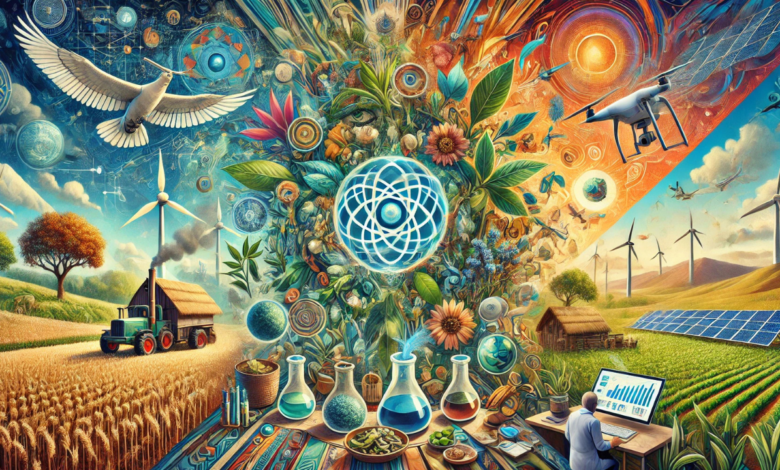Agrawau: Bridging Traditional Knowledge with Modern Innovations

In today’s fast-paced world, the fusion of traditional wisdom and cutting-edge technology is more crucial than ever. One of the fascinating examples of this blend is Agrawau—a term that signifies the integration of age-old knowledge with modern innovations. This article will explore how Agrawau serves as a bridge between the past and present, offering a fresh perspective on sustainability, cultural preservation, and technological advancement.
What is Agrawau?
The word Agrawau is relatively new in mainstream discourse, but its concept has deep roots in the rich traditions of Indigenous communities worldwide. It refers to a philosophy and practice that combines traditional knowledge systems with modern scientific methods to solve contemporary challenges. Agrawau can be seen as a cultural and technological hybrid that recognizes the value of ancient wisdom while embracing the potential of modern technology.
At its core, Agrawau is about balance—maintaining respect for traditional practices and beliefs while leveraging modern innovations to improve lives and solve pressing issues such as climate change, healthcare, and sustainability.
The Importance of Traditional Knowledge
Traditional knowledge has been passed down through generations, often embedded in indigenous people’s culture, language, and practices. This knowledge, refined over centuries, offers profound insights into agriculture, healthcare, environmental stewardship, and more. For instance, many indigenous communities have long understood how to grow crops harmoniously with the environment, utilizing crop rotation, water conservation techniques, and organic farming methods long before modern science caught up.
Traditional medicine, too, is another area where ancient knowledge has provided the foundation for modern pharmaceutical discoveries. Many medicines today originate from herbs and practices first identified and utilized by indigenous cultures centuries ago.
However, traditional knowledge alone is not always enough to tackle the complexities of today’s challenges. This is where modern innovation comes into play.
The Role of Modern Innovations in Agrawau
Modern innovations, particularly in fields such as artificial intelligence (AI), biotechnology, and renewable energy, offer powerful tools that can significantly enhance the application of traditional knowledge. As a philosophy, Agrawal leverages these innovations to help preserve cultural practices and find sustainable solutions for modern issues.
For example, AI can analyze vast amounts of agricultural data to determine the best planting and harvesting techniques, complementing traditional farming practices and emphasizing sustainable crop growth. Similarly, biotechnology can be used to improve the medicinal properties of plants long used by indigenous cultures, ensuring their efficacy in modern medical contexts.
Another example is the field of renewable energy. Many indigenous communities have long relied on natural sources such as wind, water, and sun. Modern technologies enable large-scale harnessing of these resources to create clean, sustainable energy—bringing ancient energy practices into the modern age.
Examples of Agrawau in Action
There are numerous examples worldwide of Agrawau being successfully implemented. Let’s explore real-world cases where traditional knowledge has been successfully integrated with modern innovations.
Sustainable Farming Practices
In parts of South America, indigenous communities have long practiced sustainable farming techniques, such as agroforestry, which involves integrating trees into agricultural systems. This method has been shown to increase biodiversity, improve soil fertility, and mitigate the effects of climate change.
By combining this traditional knowledge with modern technologies like remote sensing and GIS (Geographic Information Systems), farmers can optimize their land management practices, monitor soil health, and predict climate impacts, resulting in more efficient and environmentally friendly agricultural practices.
Traditional Healing and Modern Medicine
Modern scientists are now studying many plants used in Indigenous healing traditions for their medicinal properties. One notable example is the development of quinine, derived from the bark of the cinchona tree, which was used by indigenous people in South America long before it became a treatment for malaria.
Today, researchers are exploring ways to enhance the medicinal efficacy of these plants through modern biotechnology, providing new treatments for diseases that have plagued humanity for centuries.
Renewable Energy in Indigenous Communities
Indigenous communities in the Arctic region have long relied on renewable resources like wind and water to meet their energy needs. These communities can generate cleaner, more reliable energy by incorporating modern wind turbine technology and hydroelectric systems. This convergence of traditional knowledge with modern engineering offers a sustainable path forward for energy production, reducing reliance on fossil fuels.
The Benefits of Agrawau
The combination of traditional knowledge and modern innovation offers numerous benefits:
- Environmental Sustainability: Agrawau promotes eco-friendly practices, as traditional knowledge often emphasizes harmony with nature. Modern technologies allow for scaling these practices, reducing the environmental impact of industries like agriculture and energy production.
- Cultural Preservation: Agrawal helps ensure that traditional practices and cultures are not lost to modernity. By integrating them with new technologies, these traditions can continue to thrive and be shared with future generations.
- Economic Opportunities: In many cases, Agrawau creates new economic opportunities for indigenous communities by enabling them to monetize traditional knowledge through sustainable industries, such as eco-tourism, organic farming, and herbal medicine.
- Innovation and Progress: By blending the old with the new, Agrawau drives innovation. Traditional wisdom can offer insights that inspire new technologies, while modern tools can refine and enhance age-old practices.
Challenges and Considerations
While Agrawau holds great potential, it also presents challenges. One of the key concerns is the issue of intellectual property. How can indigenous knowledge be protected from exploitation by companies or individuals who seek to profit from it without benefiting the original communities? There is also the challenge of ensuring that modern technologies are applied in ways that respect and align with traditional values.
Another challenge is ensuring that the integration of traditional and modern knowledge is not forced but is a mutual process that benefits all stakeholders. This requires collaboration between technologists, indigenous leaders, and cultural experts to ensure that the fusion of old and new is done respectfully and sustainably.
The Future of Agrawau
As the world faces increasing challenges like climate change, resource depletion, and social inequality, Agrawau offers a model for the future that emphasizes sustainability, cultural preservation, and the thoughtful integration of new technologies. By embracing both traditional knowledge and modern innovation, Agrawau can provide solutions that are both innovative and grounded in respect for the past.
In the future, we will likely see more collaboration between traditional communities and innovators. As global attention increasingly shifts toward sustainability, Agrawau will be crucial in addressing global challenges and fostering a more equitable, sustainable world.
FAQs About Agrawau: Bridging Traditional Knowledge with Modern Innovations
1. What is Agrawau?
- Agrawau is the fusion of traditional knowledge systems with modern innovations, aiming to address contemporary challenges while preserving cultural practices and sustainable techniques.
2. How does Agrawau contribute to sustainability?
- Agrawau promotes environmentally sustainable practices by combining traditional ecological knowledge with modern technologies, such as renewable energy solutions, sustainable farming, and efficient resource management.
3. Can Agrawau help preserve indigenous cultures?
- Agrawau is critical in preserving indigenous cultures by integrating traditional knowledge into modern systems, ensuring these practices thrive in the contemporary world.
4. What are some examples of Agrawau in action?
- Examples of Agrawau include integrating sustainable farming practices, using traditional healing methods in modern medicine, and using renewable energy in indigenous communities.
5. What challenges does Agrawau face?
- Some challenges include protecting indigenous intellectual property, ensuring that modern technologies are applied respectfully, and fostering collaboration between traditional communities and technologists.
You May Also Read: https://usabestweekly.com/crew-disquantified-org/


